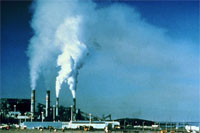Tackling climate change could save '12 billion euro' per year, says new report
A forthcoming report from the European Environment Agency (EEA) suggests that halting climate change and pollution now could save 12 billion euro per year in pollution control costs by 2030. However, results from the EU's 2005 carbon trading scheme suggest that these reductions are yet to take effect. On top of the potential savings in pollution control, the EEA report, to be titled, 'Air quality and ancillary benefits from climate change policies', suggests further huge savings in public health, including stark reductions in mortality, and in environmental damage. In order to achieve these savings, the EU must pollute less. Results from the EU's carbon trading scheme for 2005 suggest the scheme has not so far been effective. Member States issue emission quotas to polluting companies. If the company emits much less carbon dioxide, then it can sell the surplus. Companies missing their targets can buy that surplus. The 2005 results suggest a negligible difference in the quantity of CO2 emitted in the EU. In fact, as not all Member States have compiled their results, there is room for the EU to miss its targets. Furthermore, on 12 May, the price of carbon permits dropped to an all-time low, as countries were too generous in distributing carbon quotas. This means those companies exceeding their quotas will readily buy the surplus they need, and for a bargain price. The current quota limits are set until 2007. If the benefits outlined in the EEA report are to be achieved, the EU's Thematic Strategy, which aims to improve European air pollution by 2020, must be attained. The carbon trading scheme is the centrepiece of the EU's climate change policy, and is yet to get off the ground. Europe boasts some of the most polluted air and land in the world. Current policies should see an improvement in air pollution by 2020, but these improvements will not be sufficient to reduce the impact of pollution on public health. In fact, 'With existing measures only, the situation is even projected to worsen after 2020. In this scenario - 311,000 premature deaths are projected each year in 2030, due to pollution with ground-level ozone and fine particles,' reads the EEA briefing. Climate change and environmental pollution are linked - pollutants responsible for both are emitted from the same sources. Reductions in both, to limit the mean temperature rise at just two degrees centigrade above today's mean temperature will require more legislation. However, such a reduction will save 20,000 lives from premature death in 2030. The costs to achieve this will rise year-on-year. The earlier climate and pollution reduction measures are set in motion, the cheaper those measures will be to implement, saving up to 10 billion euro per year, according to the report. Most of the greenhouse and air pollutants in the EU derive from burning fossil fuels. Attaining the limit of two degrees centigrade in mean temperature rise would see a corresponding drop in environmental pollution of 10 per cent for nitrogen oxides, 17 per cent for sulphur dioxide and air particles by eight to 10 per cent. Cost savings of early implementation will be between 12 and 20 per cent by 2020 and 25 to 30 per cent by 2030. 'Even if the maximum feasible land-based reduction measures in relevant sectors for abatement of air pollution were combined with climate policies - the maximum feasible reduction scenario - there will still be 200,000 annual premature deaths by 2030 from ozone and fine particles.' The report briefing concludes that non land-based sources of environmental pollution should be reduced for the maximum benefit - especially in shipping.



